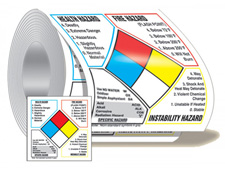| The Home page of ILPI's Safety Data Sheet (SDS) Resource, the leader in SDS information since 1995! | |
| The history and philosophy behind this resource. | |
| A curated collection of books and reference materials concerning Safety Data Sheets and closely related topics. | |
| Paste your plain text SDS into the SDS-Demystifier, and it will be converted into a hypertext-enriched document with links to detailed explanations of each key term. | |
| An extensive list of frequently asked questions about Safety Data Sheets including regulations, content, compliance, and more. | |
| A humorous take on Safety Data Sheet jargon. Fill in the blanks on our entry form to generate a personalized Unsafety Data Sheet to share with your coworkers. | |
| Since 1995, we've maintained this massive curated list of the best places to find Safety Data Sheets on the Internet. | |
| You are here! Way more than a glossary, this hypertext-enhanced resource covers hundreds of SDS-related terms and expert knowledge. Each entry includes both the SDS relevance and links to additional authoritative resources. | |
| Archived results of Safety Data Sheet related polls taken by some of our millions of site visitors | |
| The OSHA regulations behind SDS regulations, including the inspection guidelines and over 400 official interpretations letters under the Hazard Communication Standard | |
| Commercial suppliers of SDS authoring and management software as well as cloud compliance services. | |
| Commercial companies that will create SDS's for your specific needs as well as SDS translation companies. |

Safety signs, banners, and scoreboards? Get yours at Safety Emporium!
Definition

Communicate workplace hazards with handy labels from Safety Emporium.
Inflammation involves an influx of blood or other fluid into bodily tissue or organs in reaction to injury, disease, and/or foreign substances. Inflammation is marked by swelling, redness, heat, and/or pain.
Inflammations of specific body parts often carry special names which often end with the suffix "-itis". For example, inflammation of the brain is called encephalitis and inflammation of the pancreas is called pancreatitis.
Do not confuse inflammation with the term inflammable, which refers to a material that is easily ignited.
SDS Relevance
OSHA requires that Safety Data Sheets list adverse health effects under Section 11 (toxicological information). Always read your SDS before working with a material so you understand the potential health and physical hazards and how to deal with them.
Any number of chemicals can be toxins or irritants that could cause swelling of various body parts. Cancer can also cause inflammation.
Inflammation normally subsides on its own, however, if the symptom is long-lasting it can be called chronic inflammation. If you suspect a chemical is causing inflammation, avoid exposure and see if the inflammation subsides.
Further Reading

Encourage your workers to wear their gloves with stylish safety dispensers from Safety Emporium.
- Inflammation: What You Need to Know at Healthline.com.
- What Is Inflammation? at WebMD.
- What is an inflammation? at National Center for Biotechnology Information.
- Inflammation at Wikipedia.
- Treatment of Pain and Inflammation at the Merck Manuals Consumer version.
- Inflammation Clinical Trials at CenterWatch.
- The Inflammation Research Association offers free membership.
- The International Association of Inflammation Societies.
- Inflammation Research is a scientific research journal covering all aspects of inflammation and related topics including allergy and asthma, shock, pain, joint damage, skin disease as well as clinical trials.
See also: asthma, bronchitis, dermatitis, edema.